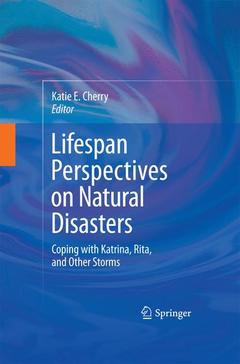Description
Lifespan Perspectives on Natural Disasters, 2009
Coping with Katrina, Rita, and Other Storms
Language: English
Subject for Lifespan Perspectives on Natural Disasters:
336 p. · 15.5x23.5 cm · Paperback
336 p. · 15.5x23.5 cm · Hardback
Description
/li>Contents
/li>Biography
/li>Comment
/li>
Some of our most disturbing images of Hurricane Katrina involve the very old, trapped in flooded nursing homes, and the very young, sick in toxic trailers. Using the Katrina-Rita nexus as its reference point, Lifespan Perspectives on Natural Disasters takes the developmental long view on human strengths and vulnerabilities during large-scale devastation and crisis. An expert panel of behavioral scientists and first responders analyzes the psychological impact of natural disasters on?and coping faculties associated with?children, adolescents, and young, middle-aged, older, young-old and late-life oldest-old adults. This timely information is invaluable both to mental health service providers and to those tasked with developing age-appropriate disaster preparedness, intervention, and recovery programs. In addition, the book references other deadly storms as well as other major catastrophic events (e.g., the September 11 attacks, the Indian Ocean Tsunami), and includes such topics as:
- Young children?s understanding of hurricanes.
- Positive adjustment in youth after Katrina.
- How families make meaning out of disaster.
- Disaster recovery in the workplace.
- Recovery services for the frail elderly.
- Coping and health in late life.
- Preparation and training mental health personnel for disasters.
Unique in the disaster literature, Lifespan Perspectives on Natural Disasters serves as a research reference and idea book for professionals and graduate-level students in psychology, social work, and disaster preparedness and services.
Katie E. Cherry, Ph.D., is a Professor of Psychology and Director of the Life Course and Aging Center at Louisiana State University. Her research expertise is adult development and aging with special emphasis on memory aging in healthy older adults. Her research is funded by the National Institute on Aging and the Louisiana Board of Regents. In 2002, she was awarded the Emogene Pliner Distinguished Professor of Aging Studies professorship for her contributions to the field of adult development and aging.

